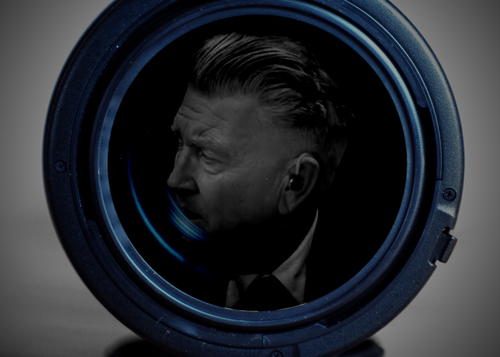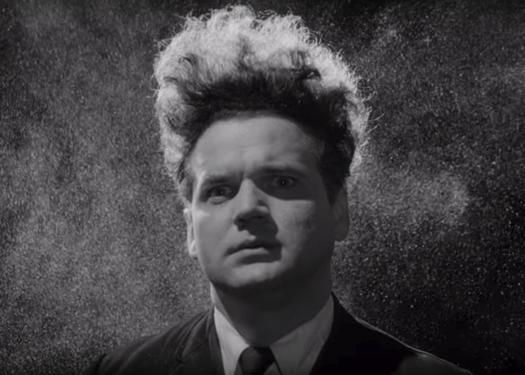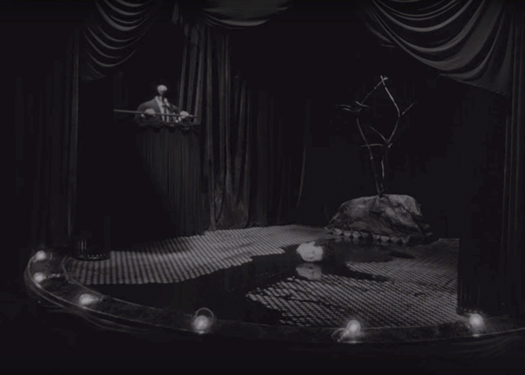David Lynch:
Looking Through the Lens of a Dream

To say that David Lynch is hard to watch or hard to interpret is looking at his work the wrong way. Well not exactly wrong, as I don’t really believe there is such a thing as a wrong interpretation, but more trying to interpret imagery as absolute bullet point fact will make the task difficult.
David Lynch spent the majority of his childhood traveling America (most of his time in the A typical white picket fence suburbia). His geographical influence of the green lawns, white fences, Stepford wives, and suit-wearing company men are shown in their rawest form in the 1986 mystery thriller Blue Velvet starring Kyle Maclachlan, Isabella Rossellini, and Dennis Hopper. At face value, its a run of the mill thriller. A subject of the times in which it was made (thrillers were big money blockbusters through the late seventies in through the end of the nineties), but on further inspection, under a microscope of understanding, scenes are jarring as some characters go from regular soap opera style acting to over the top performances at the drop of a dime. In Blue Velvet we get to look through the inner workings of the most bizarre and dangerous goings-on behind closed doors of the suburban elitists; the grim reality behind the painted smiles of an idyllic life.
If Blue Velvet had been the beginning for Lynch it would have made sense, but before the abstract “normality” of Blue Velvet, there was a film called Eraserhead.
ERASERHEAD:
A Relatable Nightmare

Released in 1977, Eraserhead is probably the most confusing film you can ever witness. It tells the story of Henry Spencer (Jack Nance) who is left to care for a very deformed infant. Such a description is selling the film short as it is probably the purest work of art that made it to the big screen. It channels many other artists that came before Lynch’s time such as Franz Kafka and Irish painter Francis Bacon.
Lynch wants to tell you a story. A story that you won’t have a grounded basis for. One he won’t tell you with words as that would be far too forward. He will instead show you the story, and if you are left asking questions he will not answer them, because there is simply no solid answer.
You will hear more people talk about Eraserhead than people who have actually watched it (in the same vein as more people talk about the book Ulysses than people have read it). Yet Eraserhead and all of Lynch’s work don’t ever meet that upper crust, high-society intimidation that comes from the book circuit.
Watching Eraserhead on my own the first two times left me baffled, shocked, and a little disturbed, but no closer to any answers.
Then, I viewed the film without any preconception of finding answers to questions that had arisen from the first few viewings. Being completely calm and relaxed, taking each scene as they come and in that, I discovered the anxiety of change. The change of settling down with a family, the pressure of working, the fears and anxieties that it will bring about how your job will threaten you with your own children.
Such issues may have you seeing your children a different way, maybe wanting to even harm them in the dark recesses of your mind. Alienation from your partner and family, self-loathing, paranoia, all of these come together in Eraserhead except it’s not traditional. It’s not a regular tale of a man struggling with life and living in technicolor. Instead, surrealism takes a better look at it with a wider eye and a literal interpretation of the words we use. For instance, you may think to yourself “My child feels alien to me”. Through Lynch’s camera, this translates to the child literally being an alien creature, a strange deformed mass of sinew crying like a foghorn.
While you are dreaming and your mind communicates to you the counseling of the hidden Id to the Ego. Your needs and fears present themselves physically within the stage of your mind. Seeking council with you, showing you what is going on around you in an off-kilter way. This is the staging area Lynch wants to present to you, this is where he communicates his work.
There is a subtlety to Eraserhead scenes that travel through the synapses of your brain to your subconscious, where they are processed and digested and stay seated where strange thoughts and figures live.
One scene has the protagonist going to dinner to meet his girlfriend’s parents. Everyone has been there. It is a very awkward moment for anyone. Thoughts spill into your mind of what you don’t want to do. You don’t want to give them the suspicion that your the wrong person for their child. You don’t want to seem as though your not up to the standard that they may have. You want them to see you as a good-natured, nice person. These are the thoughts and worries you would have the night prior to going to your partner’s house and sitting at their table where they eat, have them judge you on your manners and interests, and be expected to hold an uncomfortable conversation. If such an event had played in your mind when you went to sleep, your mind would tell you how your feeling without words, by not speaking but knowing what’s being said. The horrors making themselves manifest in many strange forms. That is the human mind. Incomprehensible to anyone who isn’t in the shoes of the owner. The nightmares and dreams we have are subjective to ourselves and ourselves only.
This new style of storytelling (at that time) is best described in one particular scene. Imagine an aging father asking you to cut the roast chicken as a subliminal test of your masculinity. You think “no problem”, but when you cut into the breast the knife slides through drawing blood from the chicken. Maybe it would turn your stomach and you wouldn’t want that. It would show weakness in the man that you are supposed to be.
Now, what could be the worst question anyone could ask you when you are dating their son or daughter? We all know the answer. It’s the one that is present like a spark off a hot iron. It’s there and by the time you see it, it’s gone again. Every time someone opens their mouth you are fearing the question will come, and for Henry, it came along with everything previously mentioned. In the scene where Henry visits his in-laws’ house for dinner and meets them for the first time, the mother corners him and asks “Are you having sexual intercourse with our daughter?” The worst possible answer would be “yes, and she is pregnant.” This is Henry’s situation and it has been so many of ours, now it’s simply played back using the lens of the dream.
Eraserhead explores your tolerance for art and level of understanding. While watching Eraserhead, everything will present itself in a stark black and white. The characters are strange and disjointed from reality, the environments are tall and foreboding, and the acting delivery is so erratic, but through all of that you still understand it. You still relate to the story that Henry has, the story of a man cast into a job, a relationship, and fatherhood with an overbearing expectancy to meet certain societal standards which Henry and most men won’t and ever fully know what to do with. That brings the anxiety of not knowing how to be a father, how to open yourself to a child or a life partner who during this time may seem like the most monstrous people in the world. To top it off, being afflicted by a sinking depression of ever enclosing world of factory (portrayed literally by the height of the factory Henry works for) and working life. It’s the feeling of entrapment and the stagnation of life that becomes more real the longer you work.
All these feelings are at the base of Eraserhead in the plot and in the characters, In the strange and beautiful way that David Lynch envisions his work, he can portray a story through a kaleidoscope of a dream-like structures and send it back to the viewer in a way we cannot interpret literally, but we understand the feelings and events in bite-sized chunks. As a whole, it may not make a satisfying narrative structure, but in the moment it can be entirely enthralling.
It is also worth noting that right before starting the filming of Eraserhead, Lynch had finished college, married Peggy Lynch, and fathered his first child Jennifer Lynch, perhaps making Eraserhead a spiritual, artistic look at his own feelings at the time.
Leave a Reply